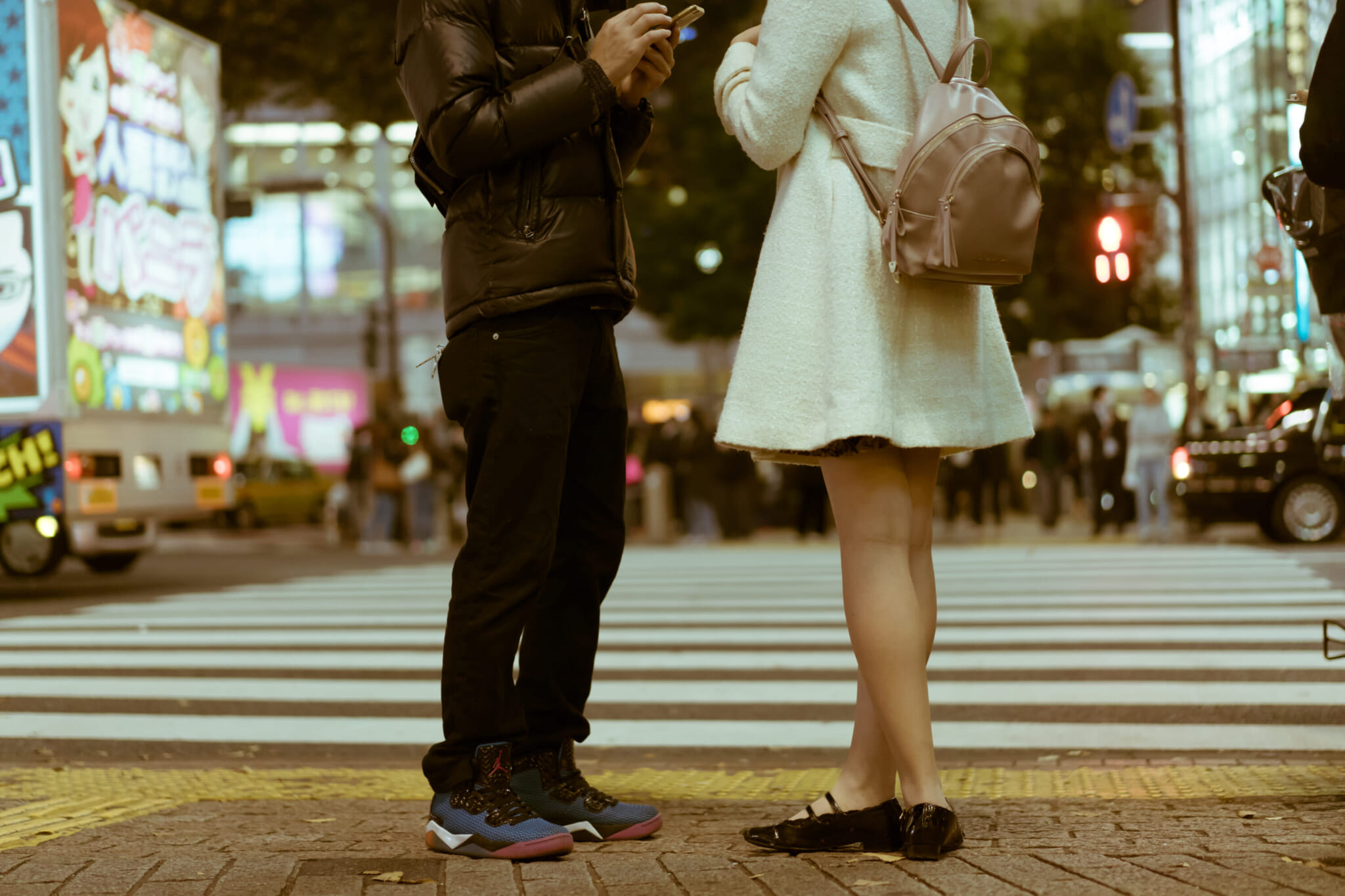Whoever said “chivalry is dead” must have experienced Shibuya at midnight, dodging the men coming at them like they’re in the last level of a zombie shooting game. Nanpa refers to the act of picking up women — or, more accurately, attempting to pick them up often randomly on the street and almost always unsolicited. It’s a big part of Japanese dating culture (the reverse, when a woman picks up a man, is referred to as gyakunan.)
If you’re visiting Japan for the first time, you’ll probably be taken aback by how forward these advances are. Though rarely dangerous, being on the receiving end of nanpa can be alarming if you’re not expecting it. I’m here to give you the rundown on what the hell nanpa is, and how you can slay the streets of Tokyo while making sure you’re safe from the grips of desperate men trying to hang out with girls.
Understanding Nanpa Culture
The term nanpa written in kanji (軟派) actually means moderate, or someone who doesn’t have very strong opinions. When written in katakana (ナンパ), though, it’s a slang term for hitting on people.
In Japan, catcalling is quite rare —In the 7 years I’ve lived here, it’s never happened to me once. Nanpa is sort of the Japanese version, though it’s different from catcalling in that these people often are asking you out with the intent of actually hanging out. In a weird way, it’s more pragmatic than just shouting across the street for a reaction.
Nanpa doesn’t exclusively refer to asking someone out on the street, either. Asking someone out at a bar, the gym or at your cousin’s wedding is all fair game in the battlefield of nanpa. If you’re walking through the streets of Shinjuku’s Kabukicho, a lot of the nanpa actually come from lower-level hosts, trying to lure new customers into their shop. I once had a host ask me, “You’re as beautiful as a diamond. Do you get that a lot?” I had to admit, that specific compliment was a first.

No Method to the Madness
It’s tempting to think of nanpa as a compliment, but I’d urge against getting too ahead of yourself if it happens to you — most nanpa practitioners will post up on a street and use the same line on dozens of girls walking by. If you actually agree to head to a bar with someone, it’s likely your willingness to accept his invitation comes after a series of rejections from other women. And keep your wits about you: the technological world has furthered us from the concept of stranger danger, but you shouldn’t trust a random person on the streets with cheap flattery. If the perpetrator happens to be particularly gorgeous, please, for the love of god, make sure you at least follow them to somewhere public and visible.
There’s no rhyme or reason to how these men choose their victims — dates, what say you. If you dress in a way that catches attention, if you look demure or approachable, if you’re foreign, if you’re local — someone will find a reason to speak to you. This is what I mean when I say it is not necessarily a compliment to get nanpa’ed. In the same vein, it doesn’t mean anything if you’ve never been on the receiving end of nanpa.

Gyakunan
Nanpa is most often conducted by a man to a woman, but that isn’t to say it doesn’t happen in queer contexts, especially in the gay district of Shinjuku Nichome, or from a woman to a man. This situation is called gyakunan, which means reverse nanpa, and usually takes place when a bold woman approaches a man in a playful manner. Since it’s rare and usually considered funny and harmless, a man receiving gyakunan will probably be very flattered (which is, under the right circumstances, understandable; women generally have nice taste). However, it’s important to remember that this attention is unsolicited, and can make the man feel uncomfortable or unsafe. Regardless of gender, if you’re trying to shoot your shot, you should be mindful of how the other person will receive your attention.
There’s also a culture of Japanese women wanting to hang out with foreign men. If you’re a foreign man, you might find that you get more attention from women in Japan. If you need a refresher, refer to my previous section: It is not a reflection of you being uniquely and overwhelmingly attractive.

Baddies Don’t Engage
My number one advice for people getting nanpa’ed is: don’t engage. I’ve tried several tricks throughout the years. The classic “Sorry, I don’t speak Japanese,” has worked for me a few times — you can use it even if Japanese is your first language! — but I’ve strangely found that this can sometimes have the opposite effect, making men hiss loudly into my ear, “Where are you from?”
I’ve tried declining politely. This once ended with a man asking for my Line for five straight minutes despite my constant demurring, and when I gave him a stern no, he grumbled, “Don’t waste my time.” I remain searching for where these men find the audacity.
In my experience, the best way to get out of an unwanted nanpa situation is to ignore the guy completely. People doing nanpa are looking for any possible reaction, any way to speak to you. If you get angry or start getting heated, they’ll have something to latch onto. I once had a particularly persistent man walk next to me for a solid two minutes, but I kept my gaze decidedly forward and not on him, and proceeded to outwalk him (never underestimate a woman’s walking speed when she wants to get out of a situation). Even the most committed nanpa-ers will give up eventually if you don’t give them anything to work with.
Staying Safe
Though it’s rare, nanpa can still escalate into scary situations. Like in any country, take precautions when you know you’re going to be alone, especially at night. Consider wearing a cardigan until you’re safely with friends if you think your bomb outfit might attract unwanted attention en route. Sharing your location or being on a call with friends while walking home are both great ways to be on the safe side.
Japan is safe, but definitely not void of creepy men. Nanpa can be weird and disturbing, but it usually makes for a funny story to tell friends afterwards. Next time you get nanpa’ed, just flick your hair and keep strutting – far, far away from them.








